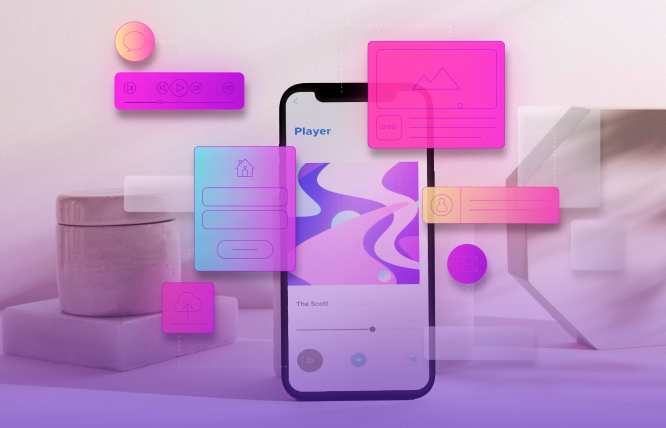Right now, someone is swiping, tapping, or upgrading their way through a mobile game, and that interaction is generating real money for someone else. The question is, why not you?
The mobile gaming market is no longer reserved for studios with massive budgets. Startups with vision, speed, and the right partner can turn simple game ideas into serious revenue engines. In a world where digital attention is gold, mobile games are becoming one of the most profitable digital assets a startup can build.
For startups, mobile game development isn’t just a tech move. It’s a gateway to a scalable, engaging, and high-ROI venture that can stand on its own or support an existing brand. Let’s explore why this space is exploding with potential.
Let’s turn your game idea into a revenue-generating product.
Why Startups Are Investing in Mobile Game Development
Startups today are looking beyond traditional apps. They want products that retain users, encourage repeat interaction, and open new revenue channels. Mobile game development for startups offers all of that and more.
Mobile games have a built-in advantage. They’re addictive by design, inherently social, and packed with monetization opportunities. Startups see this as a playground for testing innovative ideas, building loyal audiences, and even launching gamified brand extensions.
Unlike typical apps that solve a problem and move on, games keep users engaged for hours, days, even years. That level of stickiness is hard to find in any other digital product.
Is Mobile Gaming a Profitable Business Model in 2025
Absolutely. In 2025, the mobile game business model is more profitable than ever, but only when done strategically.
There are multiple layers to profitability. In-app purchases, reward-based ads, subscriptions, and hybrid models make it possible to earn from both casual and dedicated players. The mobile game business model thrives because it combines scale with personalization. You can start lean, reach global audiences, and grow without massive infrastructure.
What’s even more compelling is the low barrier to entry for high returns. A single well-crafted game can generate exponential revenue with minimal recurring cost. For startup founders and investors, this means the mobile game industry is no longer a gamble. It’s a smart, data-backed business decision.
Partner with FuturByte to build your first profitable game.
What Types of Mobile Games Generate the Highest ROI
Not all mobile games are created equal. Some rake in millions while others vanish quietly. The difference lies in the game type, how it’s built, and how well it’s monetized. For startup founders, choosing the right game genre is step one toward building a profitable app.
Here are the top-performing mobile game categories, with real examples and estimated development costs in 2025.
Casual Games
Examples: Candy Crush, Subway Surfers, Temple Run
Estimated Development Cost: $25,000 to $70,000
Casual games are the all-time champions of reach and revenue. They are simple to play, highly engaging, and designed for short play sessions. Their ROI comes from sheer volume — millions of downloads across diverse audiences.
Monetization is often a mix of ads, in-game coins, and unlockable content. With high engagement and low production time, they are perfect for startups aiming for fast market entry.
Hyper-Casual Games
Examples: Flappy Bird, Stack, Join Clash 3D
Estimated Development Cost: $15,000 to $40,000
Hyper-casual games are even more stripped-down. These are fast to develop, usually built within weeks, and rely heavily on simple mechanics and fast feedback loops.
Revenue comes almost entirely from ads, especially rewarded video ads. A successful hyper-casual game can go viral on social platforms, driving millions of installs and steady ad income. Perfect for MVPs and lean testing models.
Mid-Core Strategy Games
Examples: Clash of Clans, Boom Beach, Clash Royale
Estimated Development Cost: $80,000 to $250,000
These games offer deeper gameplay and require players to invest more time. But that loyalty often means higher spending per user. Mid-core strategy games are ideal for startups looking for consistent engagement and strong retention.
They often include building, attacking, upgrading systems, and in-game currencies. Monetization includes resource packs, battle passes, and power boosts. More complex to build, but also more rewarding long-term.
Role-Playing Games (RPGs)
Examples: Genshin Impact, RAID Shadow Legends, Final Fantasy Mobile
Estimated Development Cost: $120,000 to $500,000+
RPGs are among the most immersive and high-value game categories. Players stay for the story, the world, and the customisation. While the initial investment is high, so is the potential return.
Revenue is generated through in-game currency, limited edition characters, seasonal passes, and fan-driven content. Ideal for startups backed by serious capital or those targeting niche, high-paying communities.
Simulation Games
Examples: SimCity BuildIt, Hay Day, Farming Simulator
Estimated Development Cost: $50,000 to $200,000
Simulation games replicate real-world systems like city-building, farming, or life management. They attract focused user groups who spend consistently over time.
These games monetize through subscriptions, boosters, unlockable features, and ads. With lower competition in niche simulation categories, startups can find strong engagement and brand-building potential here.
Puzzle Games
Examples: Sudoku.com, Wordscapes, Monument Valley
Estimated Development Cost: $20,000 to $70,000
Puzzle games are evergreen. They cater to all age groups and are easy to scale. They rarely go out of style and often see consistent downloads without massive ad spend.
Monetization strategies include hints, level skips, limited-time packs, and ad rewards. Their development cost is low, but with smart placement and regular updates, they can deliver steady revenue for years.
Idle or Incremental Games
Examples: Adventure Capitalist, Idle Miner Tycoon, Egg Inc.
Estimated Development Cost: $30,000 to $100,000
Idle games are perfect for passive play. Players enjoy watching their progress grow without constant interaction. These games often go viral through word of mouth and social sharing.
They monetize through boosts, automation tools, and visual upgrades. Development is relatively simple compared to complex genres, making idle games a smart option for startups seeking passive income streams.
Calculate Gaming App Development Cost for Free!
How to Validate a Mobile Game Idea Before Investing
Here’s the harsh truth. A good idea is not always a good investment. That’s why smart founders validate before they build.
Start by stress-testing your concept. Does your game idea solve a pain point, scratch a creative itch, or offer unique fun? Run simple surveys, test a landing page, or build a clickable prototype. Early feedback is gold.
Game idea testing does not require a finished product. Even a 30-second gameplay demo can help you gauge interest. Track responses. Are people curious? Do they ask when it’s launching? That tells you more than any spreadsheet ever will.
Validation saves time, money, and credibility. It’s not just a safety net — it’s your first smart move as a founder entering the mobile game space.
Key Features That Make a Mobile Game Monetizable
Turning a game into a business starts with one thing: monetization built into the experience. And no, that doesn’t mean spamming users with ads.
To successfully monetize a mobile game, you need thoughtful game monetization features. Start with in-app purchases. Skins, upgrades, power-ups — these are small spends that add up fast.
Reward-based video ads also work wonders. Players get a boost, you get revenue. It feels like a win-win, and that matters.
Another critical feature is player progression. Games that evolve with the player keep them invested. The more time they spend, the more likely they are to pay. That’s where the real value of mobile game development as a business comes in.
Finally, data tracking is essential. Know what your users love, when they drop off, and what makes them return. Games that listen to users end up building communities, and communities spend more.
How Mobile Game Development Works at FuturByte (Visual Roadmap)
Building a mobile game may seem complex, but it's not with the right roadmap. At FuturByte, we guide startups through every step from raw idea to revenue-generating product.
Here’s how we make it happen.
1. Ideation and Game Concept
This is where it starts. You bring the idea, we help shape it. Together, we define the game genre, mechanics, visual tone, and monetization vision. We validate your concept against market trends and player psychology to make sure it has the potential to scale.
2. Wireframes and Prototyping
Ideas become visible. We create low-fidelity wireframes and playable prototypes to test core mechanics and user flows. You get to see your game in motion before a single line of production code is written. Fast, affordable, and designed to collect feedback early.
3. Development and Testing
Our dev teams build your game using leading engines like Unity or Unreal. From backend logic to smooth gameplay animation, this is where the vision comes to life. We run continuous testing to eliminate bugs, balance gameplay, and fine-tune performance for all devices.
4. Monetization Integration
Monetization is a part of the build, not an afterthought. We embed reward systems, in-app purchases, and ad placements strategically to maximize revenue without harming user experience. Whether it’s one-time boosters or subscription models, we help you earn smart.
5. App Store Launch
We handle the entire publishing process from app store optimization to compliance checks. Your game is launched on iOS, Android, or both, with full support on naming, descriptions, ASO keywords, and creative assets. First impressions count, and we make yours strong.
6. Growth and Scaling
Once live, the real game begins. We track performance, run A/B tests, and optimise monetization strategies. We also help scale through influencer seeding, ad campaigns, and regional expansion. Your mobile game becomes a growing business asset — not just an app.
Start your mobile game journey with the team that scales startups.
Cost of Mobile Game Development for Startups in 2025
Before diving in, every founder asks the same question. What will it cost to build my mobile game app?
The answer depends on the complexity of your idea, the platform, and the quality you’re aiming for. In 2025, the mobile game development cost for startups typically ranges from $25,000 to $150,000 for a fully functional MVP. Here’s a simple cost breakdown of mobile game app development:
-
Game Design and Concepting – $3,000 to $8,000
-
Development (Coding and Game Engine Work) – $10,000 to $60,000
-
Art and Animation – $5,000 to $40,000
-
Sound Design and Music – $2,000 to $7,000
-
Testing and Optimization – $2,000 to $10,000
-
Launch, Analytics and Scaling Setup – $3,000 to $20,000
Keep in mind, these are average costs. Going cross-platform, adding multiplayer features, or using AR can shift things upward. But the point remains, a lean, well-planned game doesn’t need to break the bank to deliver results.
Calculate Gaming App Development Cost for Free!
Monetization Strategies and Scaling Mobile Game Development Project for ROI
Earning from your game is not luck, it’s strategy. The most profitable mobile games use layered monetization strategies that blend user experience with scalable revenue streams.
Start with in-app purchases. These are the bread and butter of game monetization. Players can buy gems, boosters, coins, and anything that enhances gameplay or progress. The key is to offer value, not disruption.
Ads, when placed wisely, do more good than harm. Rewarded video ads are a top choice. Players voluntarily watch ads to gain bonuses. You earn while keeping them happy.
Subscriptions are rising in mobile gaming. Exclusive access, ad-free versions, or elite membership can be bundled into monthly pricing, creating predictable income.
As your user base grows, so should your revenue. This is where scaling kicks in. Use data to tweak your funnels, test pricing models, and expand to other regions. Your game becomes more than a product — it becomes a growing digital asset.
Case Study: How a Startup Game App Achieved 5x ROI in One Year
Game: “Join Clash 3D”
This mobile game wasn’t built by a gaming giant. It came from a small startup team that focused on execution, not perfection. “Join Clash 3D” is a hyper-casual game that exploded in 2020 and it’s still profitable in 2025.
With a development budget of under $50,000 and a simple yet addictive concept, the game has gone on to earn millions. Its success came from a focused approach that included:
-
Fast prototyping
-
Quick user feedback
-
Aggressive testing of ad creatives
-
Reward-based video monetization
-
User acquisition through TikTok and low-cost ad platforms
The result?
Over 100 million downloads, and a 5x ROI within the first 12 months. This mobile game success story proves that simplicity, speed, and smart monetization can outperform overbuilt, slow-to-launch apps.
For startups, this is not just an inspiring tale. It’s a reminder that with the right team and a lean approach, your game idea can become your next revenue engine.
Why FuturByte Is the Right Partner for Your Game Vision
You’re not just building a game. You’re building a business, an experience, and a revenue stream all rolled into one. And that requires more than coders. It requires a partner who gets the full picture.
As a seasoned mobile game development company, FuturByte offers more than development. We guide startups from concept validation to monetization and growth. Whether you’re launching your first MVP or scaling to millions, we help you build strategically and profitably.
What sets FuturByte game services apart?
-
Dedicated product strategists who understand the startup mindset
-
Artists and animators who bring ideas to life with addictive visuals
-
Game architects who bake monetization into the user journey
-
Growth teams who prepare your game for launch, scale, and success
We don’t just develop games. We help you create digital products that people play, share, and pay for again and again.
Validate, build, and launch your mobile game with confidence.
Key Takeaways
Mobile game development offers startups a powerful path to scalable profit. With low entry barriers and high-ROI potential, even simple games can generate serious revenue. From hyper-casual hits to mid-core strategy games, success lies in smart validation, built-in monetization, and fast execution. With the right partner like FuturByte, founders can turn game ideas into lasting digital assets that attract users, retain attention, and drive long-term growth.
Frequently Asked Questions
For most startups, a mobile game MVP can cost between $25,000 and $150,000, depending on features, platform, and complexity. Additional costs may include scaling, marketing, and live operations.
A simple mobile game may take 8 to 12 weeks, while more complex games can range from 4 to 9 months. Time depends on game type, design scope, and iteration cycles.
The most effective monetization strategies include in-app purchases, rewarded video ads, subscriptions, and hybrid models. The ideal mix depends on your audience and game genre.
Not at all. We work with non-technical founders and marketing-led teams. You bring the idea or vision, and we handle everything from design to deployment.
Yes. Many startups have turned simple game ideas into sustainable revenue streams. With the right product-market fit and monetization model, mobile games are a scalable and investable business.
Have questions or feedback?
Get in touch with us and we‘l get back to you and help as soon as we can!




